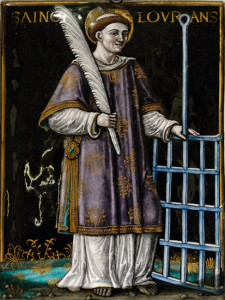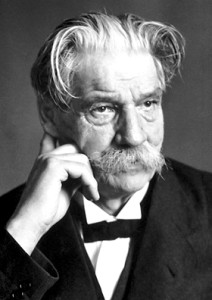As the drive toward the Golden Halo continues, we meet a martyred 3rd century deacon and an early 20th century renaissance man, humanitarian, and Nobel Prize winner. Lawrence lived out his faith in Rome, giving all that he had to the poor while Albert Schweitzer gave much of his energy and talents to building hospitals to care for the sick.
Yesterday, in the second lopsided contest in as many days, Sojourner Truth set Soren Kierkegaard free 77% to 23%. She'll face the winner of Frances Joseph-Gaudet vs. John Mason Neale in the Saintly Sixteen.
And remember, if anyone "grills" you about Lent Madness today, just tell them it's the world's greatest online Lenten devotion!
Lawrence
 Lawrence of Rome was a deacon who was martyred during the Valerian persecution of the Roman Church in 258. As he watched Pope Sixtus II being taken into custody, Lawrence cried out, asking Sixtus, “Father, where do you go without your deacon?” Sixtus replied that he would not leave Lawrence, but that Lawrence would follow him in three days. Upon hearing Sixtus’s statement, and in apparent joy that he would soon meet the nearer presence of the Lord, Lawrence went out and offered all he had to the poor, the widowed, and the orphans of Rome, even selling the vessels of the church to increase the amount of alms to distribute. When a Roman prefect became aware of Lawrence’s fire sale, he charged Lawrence to yield all the treasures of the church to the emperor within three days. Lawrence agreed to do so.
Lawrence of Rome was a deacon who was martyred during the Valerian persecution of the Roman Church in 258. As he watched Pope Sixtus II being taken into custody, Lawrence cried out, asking Sixtus, “Father, where do you go without your deacon?” Sixtus replied that he would not leave Lawrence, but that Lawrence would follow him in three days. Upon hearing Sixtus’s statement, and in apparent joy that he would soon meet the nearer presence of the Lord, Lawrence went out and offered all he had to the poor, the widowed, and the orphans of Rome, even selling the vessels of the church to increase the amount of alms to distribute. When a Roman prefect became aware of Lawrence’s fire sale, he charged Lawrence to yield all the treasures of the church to the emperor within three days. Lawrence agreed to do so.
Lawrence went out among the city, seeking the lowest of society, the sick, the outcast, the orphaned, and the unloved. Three days later, this gathering made their way to the Roman prefect, who turned to Lawrence in rage. Lawrence, seeing the official’s anger, turned to him and reportedly asked, “What are you displeased at? These are the treasures of the Church.”
In return, Lawrence (sometimes spelled Laurence) was condemned to a slow death on a hot gridiron. After hours of torture, Lawrence is reputed to have quipped, “Let my body be turned; this side is well done enough.” After still more time, he spoke to his executioner, saying, “Assam est; versa et manduca!” which translates roughly to, “It is well done; turn it over and eat!” With his final quip, he died. While modern scholars have dismissed the legend as a fable, the story was clearly known to Ambrose, Augustine, and Prudentius, among others. After Constantine’s legalization of Christianity in 315 CE, a chapel was constructed over Lawrence’s grave in the Roman catacombs.
Lawrence’s martyrdom continues to inspire devotion. For his piety and charity to the poor and outcast of Rome, he remains venerated as one of the city’s patron saints. While traditionally depicted in art holding a gridiron, the legendary instrument of his death, he is not, so far as sources can tell, the patron saint of American football, but he is the patron of archivists and librarians.
Collect for Lawrence
Almighty God, you called your deacon Lawrence to serve you with deeds of love, and gave him the crown of martyrdom: Grant that we, following his example, may fulfill your commandments by defending and supporting the poor, and by loving you with all our hearts; through Jesus Christ our Lord, who lives and reigns with you and the Holy Spirit, one God, for ever and ever. Amen.
Albert Schweitzer
 Polymath Albert Schweitzer was born January 14, 1875, in Kayersberg, Germany (now France). He was the son of a Lutheran pastor and studied theology at what is now known as the University of Strasbourg. He wrote many important volumes, perhaps none as influential as The Quest for the Historical Jesus. He was also an internationally regarded concert organist and musicologist.
Polymath Albert Schweitzer was born January 14, 1875, in Kayersberg, Germany (now France). He was the son of a Lutheran pastor and studied theology at what is now known as the University of Strasbourg. He wrote many important volumes, perhaps none as influential as The Quest for the Historical Jesus. He was also an internationally regarded concert organist and musicologist.
In 1905, at age thirty, Schweitzer felt called to take up medicine to help those in need. Eight years later, Schweitzer and his wife, Hélène, founded a hospital in Lambaréné Gabon in French Equatorial Africa. In 1917 they were sent to a French internment camp as prisoners of war. Four months later they were released. The following year, they returned to Europe, where Schweitzer resumed writing books, performing concerts, and preaching in churches. In 1924, Schweitzer returned to Lambaréné, where he lived until his death on September 4, 1965. He used royalties from books, speaking fees, concert revenues, and donations to transform the humble hospital into a massive complex capable of serving more than five hundred patients at a time.
He was awarded the 1952 Nobel Peace Prize for his work in Africa. In his later years, he used his platform to warn against the dangers of nuclear proliferation and to lobby for an end to nuclear testing. He is buried on the hospital grounds with his wife. A cross he made with his own hands marks his grave.
Collect for Albert Schweitzer
Almighty God, whose will it is to be glorified in your saints, and who raised up your servant Albert Schweitzer to be a light in the world: Shine, we pray, in our hearts, that we also in our generation may show forth your praise, who called us out of darkness into your marvelous light; through Jesus Christ our Lord, who lives and reigns with you and the Holy Spirit, one God, now and forever. Amen.
[poll id="152"]
209 comments on “Lawrence vs. Albert Schweitzer”
Lawrence. For distributing goods to the poor and pointing out the "treasures of the Church." I admire his bravery and his sense of humor! Also he is the patron saint of librarians.
Librarians, unite! Lawrence!
I remember seeing the church in Rome that marks the spot where the martyrdom happened.
Lawrence the Martyr for me.
Much as I love Lawrence, making my first retreat at the Convent of St Lawrence in Belper, I had to vote for Albert. To set all his considerable gifts int eh service of the poor is an extraordinary example. I do wish we knew more of Lawrence though, his sense of humour in extreme circumstances is a joy.
2/26 I'm Lost ! I've tried everything, but still can't find today's match. This is worse that the withdrawal I have to go thru' after the golden halo is presented !
Marjorie, type http://www.lentmadness.org in the address line--only that--and it should be right at the top of the page, on a computer or on the phone.